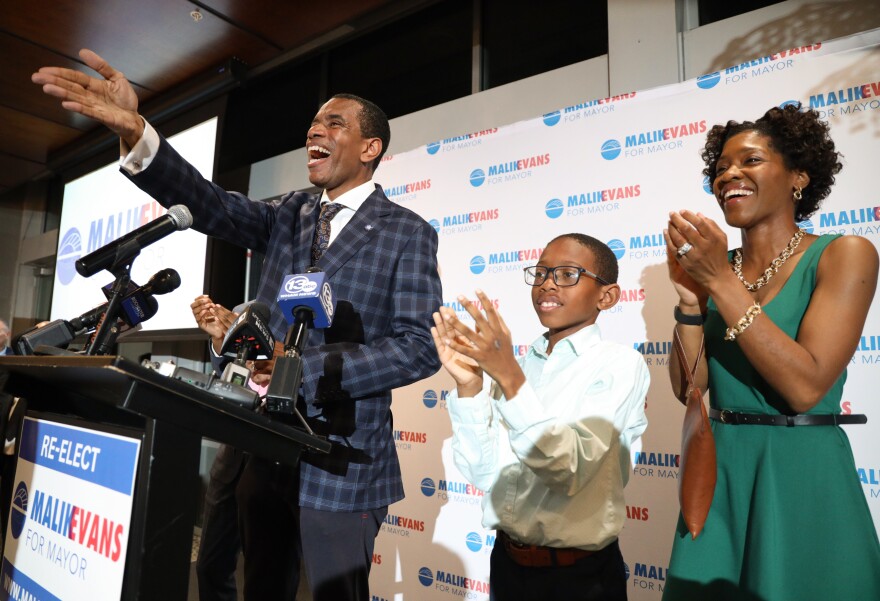An emotional Mayor Malik Evans took the stage Tuesday evening having comfortably won the Democratic primary, and he spoke about loss.
“I'm emotional because my father, as you know … my father and mother were with every campaign with me. I had mom and dad, and I don't have them here,” he said.
Evans lost his mother in 2012, and his father in 2018.
The first-term mayor, flanked by his wife and two sons, also reflected on the loss of close friend and advisor Victor Saunders, who died in May. He quoted the Bible. And he spoke about the power of the voters. All incumbent Democrats easily won their city primaries Tuesday, despite strikingly low turnout.
In a heavily Democratic city where primaries historically decide the final outcome, Evans re-election appears likely with only Conservative Party candidate Louis Sabo standing in the way this November. But Evans told supporters their work is not done.
“We understand that the power comes not from City Hall but from the neighborhoods,” he said. “That the power comes not from elected officials, but from all of you in this room, and all the work that you do to help transform our community.”
Elected mayor in 2021, Evans faced a challenge this year from Rochester City Councilmember Mary Lupien and businessman Shashi Sinha. Unofficial election results show Evans ending the night with 57% of the vote to Lupien at 33%, and Sinha at 10%.
Thus far, just over 13,400 mayoral votes have been tallied. The past two mayoral primaries — in 2021, and in 2017 — each saw about 20,500 ballots cast.

Taking the podium at the Strathallan’s ninth-floor ballroom on East Avenue, Evans thanked the crowd of dignitaries and constituents.
“You elected a leader, and I want to be your leader as we continue to tackle public safety, to ensure that we send the message that one shooting is way too many,” Evans said. “That we continue to expand job opportunities for young people to make sure that we know that the best violence prevention program is a J.O.B.”
“And that we understand that the power comes not from city hall but from the neighborhoods, that the power comes not from elected officials, but from all of you in this room and all the work that you do to help transform our community,” he continued.
Across the river at Roc Arts Events Space on Tremont Street, Lupien conceded to Evans. A second-term Councilmember representing the city’s East District, Lupien will continue to serve on the legislative body.

"I wanted to win, but I started this campaign to have a conversation with the community about what we could do different,” Lupien said. “Because what is happening right now, the status quo, is not working. It's not working for most of our residents. However, it is working for some, right? There are powerful people that are benefiting from how things are, and that's why we don't see change.”
Sinha, a first-time candidate who ran on a campaign of building swaths of new city-funded housing, also conceded Tuesday evening.
“It was one hell of a campaign,” Sinha said. “Within short six months, I hope that we brought up some of the things that are important to Rochester, and people see it. We have built up a following, and I pointed out the struggles of neighborhoods, especially in the northeast, that we need to worry about.”
This year’s primary saw a particularly crowded pool vying for the five at-large City Council seats up for election. A total of 15 candidates were on the ballot for the seats.
The three incumbents, Stanley Martin, Miguel Meléndez and Mitch Gruber, all advanced, along with Chiara “Kee Kee” Smith and Lashunda Leslie-Smith. Martin was the highest vote-getter, according to unofficial results.
Smith ran on the People’s Slate, a Democratic Socialist group of candidates that also includes Martin, while Leslie-Smith ran on a slate aligned with Evans, Gruber, and Meléndez.
The survival of Council’s minority progressive bloc was not a foregone conclusion coming into Tuesday’s primary. Now it appears likely.

“We may not agree on everything,” Martin said, “but look at the record: We passed Good Cause (eviction protections) with 7-to-2. We passed a resolution to have the mayor to do a vacancy study, this is something based on community and that went forward us being in the minority and us not agreeing on everything.
“So, I do believe things are possible,” she continued, “and I’m hoping going into the next four years there is some kind of reset button.”
Martin said she thought the strife on City Council seen over the past four years was borne from the majority purposefully positioning itself at odds with the progressive members.
Councilmember Mitch Gruber believes the opposite is true. He said the body as a whole needs to place its focus on effective local policy and defending itself against the Trump Administration.
The city is being sued by the Department of Justice over its sanctuary city policy, and the administration has threatened to pull funding from sanctuary cities—although the latter policy has been blocked by the courts.
“The divide between what people call progressivism and, I’m not even sure what people would call the alternative, is largely a manufactured difference,” Gruber said. “One of the problems I think we have collectively, and we saw that today with the low voter turnout, is discontent in the Democratic Party."
“If we want to fight each other and not fight against what’s happening in Washington, that’s a choice people make,” Gruber said. “That’s not a choice I’m going to make.”
Includes reporting by senior producer Veronica Volk.



